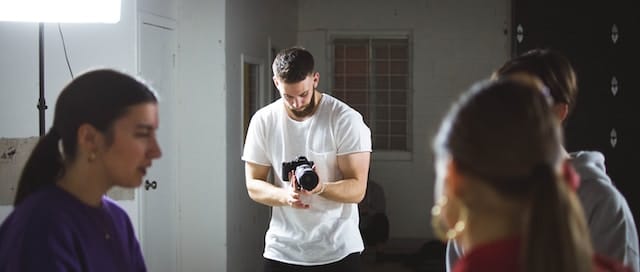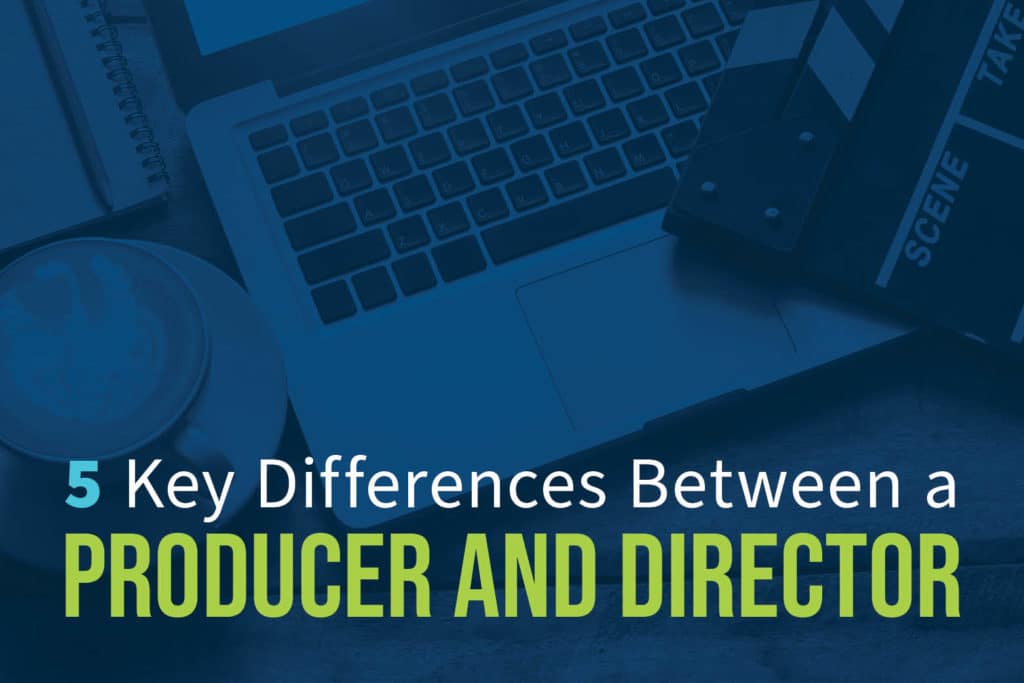
The credits are rolling on your favorite movie. You see the director, actors and writers receive their customary applause as you get up for a snack. Then the role of the producer appears, sometimes multiple at a time. You pause and sit back down. What does the producer do?
They are often spoken about when discussing anything to do with film, and their role can vary depending on the project they’re working on. Mostly, the producer is in a leadership position on films and TV shows, and focuses on the financial and logistical side.
They are there to ensure the job gets done from the initial development to post-production!
In this article, we’ll discuss what a producer does in their daily lives, and how you can forge a path into becoming one, from the experience you’ll need, education, to building your own network of creatives. Let’s go!
Understanding the Role of a Producer
What is a Producer?
A producer works on all aspects of a production. From the initial development, planning, execution to the eventual release and marketing, a producer focuses on the bigger picture. A studio or production company employs some producers, while others are self-employed, moving from project to project. Marketing agencies also employ producers who specialize in advertising.
Without a producer on board, a project can be directionless. With many producers specializing in one or two types of projects, such as film and TV or commercials and advertising, they are a vital cog in the ever-turning filmmaking machine. Producers are also required in theater to bring a stage show to life in the same way as a movie or television show.
For our full breakdown of what a producer does and all of their responsibilities, check out our dedicated article: What Does a Producer Do?

Producer vs. Director
You’d be forgiven for confusing the roles of a producer and a director. In fact, they work closely together, and their responsibilities can overlap, especially in the creative side of a project. They are great collaborators who help make key creative decisions that in turn inform the logistical and financial scope of the project.
A director’s job is to manage the creative aspects of production and is responsible for the vision and aesthetic of the final product. From camera placement to directing actors, to sound design and costumes, the director gets the final say.
Ultimately, producers are there to supervise the big picture in terms of the finance and business side.
A producer will liaise with investors, take charge of marketing and the overall commercial success of the project. They thrive on logistics and organization.
The Life Cycle of a Production from a Producer’s Perspective
A producer’s role is multi-faceted, with many responsibilities across a project’s lifetime.
Pre-Production
• Focus on the commercial feasibility of different creative projects.
• Gather finance from investors.
• Purchase projects that are deemed creatively and financially viable.
• Build a strong team of creative talent (actors, crew, director, writers, etc.) to get the project off the ground.
• ‘Green light’ projects with the assistance of the production company.
Production
• Manage the logistical and business operations of the production.
• Overseeing the production.
• Collaborating with the director to hire key crew members, e.g., the cinematographer, casting agents.
Post-Production
• Overseeing the editing process.
• Work with the marketing team to promote the project to audiences.
These responsibilities remain consistent no matter how small or large the project is. Whether it’s a short film or a major blockbuster, a movie producer’s role doesn’t change. There are only a few differences; a short film producer may serve as the producer, writer and director, for example.
Similarly, in larger projects, the producer will be just that – the producer. However, there is always more of a political element to a producer’s role if they are working with a studio, as they’ll need to seek approval for many decisions they make. On the flip side, studios usually secure financing more reliably than an independent film.

The Many Faces of a Producer
So, we’ve covered the main responsibilities of a producer and what their job entails throughout a project’s lifetime. However, if you have been paying close attention to those credits at the end of a movie or TV show, you may have seen various types of producers
Yes, in general, they all share a common blueprint for what their role entails. Producer is used as an umbrella term for the most part and can encompass several types, especially in larger productions:
Executive Producer
An executive producer is the top dog, leading communication between all other producers. They will be the ones securing investment and work closest with the director on creative decisions. Without investment, the project cannot get off the ground
Sometimes, the executive producer will part or fully finance the project themselves.
Creative Producer
Taking the lead on the creative aspects of the project, a creative producer will take charge of finding the best director for the job. From there, they assist with casting, recruiting crew members. In essence, they are the overlap between creative and operations, ensuring strong communication between the two.
This can mean wearing several hats simultaneously, bring privy to both sides of the production. Equal parts practicality and creativity.
Line Producer
A key player in the pre-production process, a line producer takes responsibility for budgeting and logistics throughout production.
Associate Producer
Much like a director can have assistant directors, producers also have associate producers. They’re there to support higher-level producers in ensuring stuff gets done. An ideal early position for an aspiring producer, the associate producer role moves between both the creative and practical elements of production.
Post-Production Producer
Unlike the other producers we’ve discussed so far, the post-production producer comes on board purely for the editing process. Their role overlaps with an editor, and they are required to also be skilled in video editing. Normally, they will work with the director to ensure the final creative vision is captured.
Visual Effects Producer
Like the post-production producer, the VFX producer will supervise the visual effects team, should a project require it.
Segment Producer
You’ll usually come across a segment producer in documentary or continued broadcasting. They’ll take the lead on an individual segment, such as an episode or a production unit.
How to Become a Producer: A Step-by-Step Guide
Like many jobs in the creative industries, there is not necessarily a right or wrong way to break into your dream role. However, there are some things you can do, depending on what stage you are at in your career.
- Educational Pathway: High School
As a high school student, think about curricular and extra-curricular things you can do to enhance what you’re already focusing on in class.
For example, a producer needs to be financially savvy, so perhaps enroll in a business class to further your knowledge alongside Math class.
Ensure you’re technically up to date with your computer skills and read up on business law specifically within the film industry.
After class, why not join a drama or film club to gain practical experience? It’s a great way to meet peers with similar passions and discover what you enjoy about filmmaking or theater. Look up local holiday clubs for your time off school for more intensive courses.
Search for local work experience opportunities with production companies. You could also gain experience on a local short film set or tag along to see what it’s all about.
All these should be relatively inexpensive or free, so very accessible if you’re just starting out on your journey. - Educational Pathway: Earning a Degree
Many aspiring film and television producers decide to embark on a bachelor’s degree in film studies. Or if you know that your path lies in theater or advertising, you can choose a relevant degree in either of those fields to gain the knowledge and experience you need. To find out more about film degrees, check out our article here.
Whether you choose a specific film school or enroll at a college that offers your chosen degree subject, ensure you research carefully. Some film courses will have production emphasis, while others will focus more on directors, writers, or editors, to name just a few.
What can you expect to cover in a film degree? From the entire process of making a movie, to editing tools and techniques, audio production all the way through to logistics and financing, you’ll gain insight into the world of film production and what it takes to be a successful producer.
At the end of most film degrees, students draw on everything they’ve learned to create their own short film, from idea inception to post-production. Here, they have the opportunity to work with students from other courses and begin to build a network of talent that they can potentially draw on in their later careers.
We also recommend looking for a degree that offers practical work in the industry. You can only learn so much in the bubble of a course, so getting out into the wide world of the industry you’re keen to work in will set you in good stead as you pursue your career after your degree.
If this isn’t possible, be proactive. Research local internship opportunities with production companies or other filmmakers in the area. Similarly, if you’re an aspiring theater producer, a local community theater may have opportunities you can take advantage of. For commercial producers, look for advertising agencies - Gain Experience
Once you’ve graduated from your degree, it’s time to look at entry-level positions within the industry. You’ll need first-hand experience working on set, some of which you should already have from your degree. Most importantly, you must be prepared to take on any job asked of you (within reason!) and generally be a good person to be around. Set a positive and open tone with everyone you work with
As we mentioned at the start of the article, there is no one way to become a producer. Some start as actors, writers, directors and other crew members.
You could begin your career as a production assistant on a film set, helping with all aspects of the production process. From there, you can progress up the ladder. Other entry-level positions include associate producer, assistant editor, assistant camera operator, and sound trainee.
It’s no secret that the film, television, theater, and advertising industries are extremely competitive. It can be difficult to find an entry-level job quickly, so be proactive. You could make your own short film, or work on your peers’ projects. - Build a Network
If you take one thing away from this article, it’s the importance of networking. Being a good person and colleague is something that is extremely well-regarded.
Join a professional network within the industry, such as the Alliance of Motion Picture and Television Producers or the Association of Independent Commercial Producers, to root your name and skills.
Attend film festivals and industry events to meet other creatives in person. It’s all well and good messaging online, but nothing beats a face-to-face conversation to showcase who you are as a person.
Related Celtx Article: 11 Best Schools for Screenwriting in America

Build schedules, break down scripts, and keep every department aligned —
Try Celtx for free.
Job Prospects and Career Growth
With any job, one has to consider what their future actually looks like in this role. Let’s break down what a film producer’s path might look like.
Demand for Production Professionals
With the rise of television and streaming platforms, qualified production professionals have become more and more in demand. Coupled with this is the volume of people looking to break into the industry. Make sure you prepare yourself with as much experience as possible.
Remember, if you’re US-based, most major job prospects are in Los Angeles or New York, so ensure you’re within reasonable distance if you’re looking to break into larger scale productions.
For smaller productions, demand is lower, especially in theaters.

Continuous Learning and Development
Remember, learning doesn’t stop at the end of your college degree. Ensure you’re keeping up with industry trends via newsletters and articles. Know what’s happening and consistently seek out new development opportunities.
FAQs
Not necessarily. While a film or media degree can help you build foundational skills and connections, many producers come from unrelated backgrounds. What matters most is industry knowledge, project experience, and strong creative and organizational instincts.
Producing requires a blend of creative, logistical, and leadership skills. New producers benefit from strengths in communication, budgeting, negotiation, problem-solving, and understanding storytelling from a high-level perspective.
Most producers start small: student films, indie projects, shorts, or assistant roles. Building a portfolio of completed work — even low-budget projects — is key to demonstrating you can guide a production from idea to delivery.
Both paths are valid. Working at a production company offers mentorship, structure, and steady work. Freelancing gives you more creative control and flexibility, but requires building your own network and managing your own workload.
Absolutely. Many producers transition from other creative roles once they’ve gained experience collaborating across departments and managing projects. Cross-disciplinary knowledge is a huge advantage.
Conclusion
It’s clear that producers are in high demand; nothing gets made without them. With a wide range of responsibilities, the scope of their role is infinite.
As an aspiring producer, you’ll need:
• A can-do attitude
• Relevant degree (optional)
• A strong network
• Experience working on a film set/theater set/in advertising.
As we’ve discussed, there are many paths into a career as a producer. How will you make it?
Focus on your story, not your formatting.
Let Celtx’s Script Editor automatically apply all industry rules while you focus on the story.
Up Next:

Producer vs. Director: Roles, Responsibilities & 5 Key Differences
Once you understand the path to becoming a producer, it helps to see how that role compares to the director’s. This guide breaks down how producers and directors collaborate, where their responsibilities overlap, and how each contributes to bringing a project from idea to screen.
